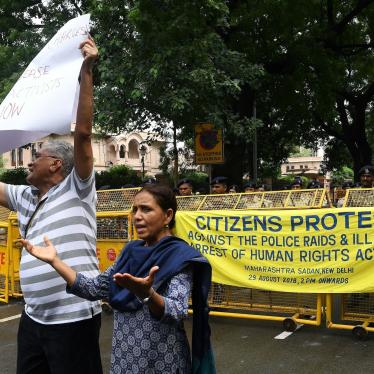(Brussels, June 24, 2013) – The 32nd round of the European Union (EU)-China Human Rights Dialogue further lowers the bar for effective, principled human rights diplomacy, Human Rights Watch said today.
The dialogue is to be held in Guiyang, Guizhou province, on June 25, 2013. Many of the topics address pressing concerns, including the death penalty, arbitrary detention, and restrictions on the freedom of expression. But the utility of the dialogue will be limited by the choice of location, which prevents participation by, or access to, senior Chinese government and EU officials, human rights defenders, civil society representatives, or the press.
“This is precisely the kind of ‘dialogue’ the Chinese government likes best: away from senior Chinese officials, away from the international press, and with little ambition from either side to apply rights protection to real life situations in China,” said Lotte Leicht, EU director. “With each successive round, the Chinese government feels less obliged to make changes, while the EU accepts progressively more restrictive conditions for even holding the dialogue.”
In the three months since Xi Jinping formally assumed China’s presidency, few if any significant steps towards better human rights protections have emerged. Although the new leadership has rhetorically hinted at serious reforms – such as abolishing the notorious system of arbitrary detention known as Reeducation through Labor, in which access to a trial is denied but individuals can be held for up to four years; reforming the “household registration” (hukou) system that discriminates against rural residents; and cracking down on corruption – few systemic reforms have actually been proposed.
Officials have also not refrained from persecuting government critics and their family members during this period. Chen Kegui, the imprisoned nephew of blind legal activist Chen Guangcheng, continues to be denied effective treatment for appendicitis, while the brother-in-law of Liu Xiaobo, the imprisoned Nobel Peace Prize winner, was given an extraordinarily harsh sentence of 11 years on fraud charges in June. Despite President Xi’s repeated public commitment to cracking down on corruption, four people were detained on March 31, for unfurling banners in a Beijing public square calling on the government to implement a policy to require officials to publicly disclose their assets. Since that time, the police have detained and arrested 11 more for allegedly participating in the same campaign.
In June 2012, EU foreign ministers adopted a sweeping package of new policies that committed the EU to “place human rights at the center of its relations with all third countries, including its strategic partners,” and “throw its full weight behind advocates of liberty, democracy, and human rights throughout the world.”In the past year, the EU has raised China in recent statements at the United Nations Human Rights Council, in the United Nations’ Third Committee, and through some public statements.
Yet, one year after adopting the human rights package, the EU and its member states have done little to publicly impress human rights concerns on Chinese leaders, and their pledge to firmly back human rights defenders increasingly looks like an empty gesture as far as Chinese activists are concerned. Rather than answering Chinese government intransigence over two rounds of the human rights dialogue per year by devoting one annual session to interacting with civil society, the EU has accepted dialogues that take place far from public view. It does not publicly discuss whether there has been progress in the individual cases it raises with the Chinese government. When accepting the 2012 Nobel Peace Prize, the EU leadership at the ceremonies in Oslo appeared unwilling to even mention Liu Xiaobo, the imprisoned Chinese government critic and 2010 Nobel Peace Prize laureate, by name.
The EU has declined to take steps that would make the dialogues more meaningful in human rights terms, such as creating public benchmarks to measure progress towards abolishing all forms of arbitrary detention, ending enforced disappearances, and investigating and prosecuting those involved in running illegal detention facilities known as “black jails.” Instead, it has allowed the mere holding of the dialogues to become a deliverable unto themselves, Human Rights Watch said.
“If the EU wants to be a serious defender of human rights, this so-called human rights dialogue must be overhauled,” Leicht said. “EU representatives and member states must pursue a more determined, ambitious, and transparent policy on behalf of human rights, and they must address concerns at the highest levels of government instead of conveniently parking them in a low-level, non-transparent diplomatic exercise.”
The dialogue that the EU is having with Chinese government officials should not and can never be a substitute for the Chinese government engaging with ordinary people, including those who criticize its policies. A key priority for the EU should be driving home the message that the Chinese government should be holding human rights dialogues with its own critics, such as Liu Xiaobo, rather than imprisoning them. The EU and its member states need to articulate a strategy on how they can pursue releases of those imprisoned for their peaceful activism, and use the combined leverage of the EU and all its member states sending the same messages of concern, setting the same human rights benchmarks, and pursuing the freedom of imprisoned activists in a transparent and dedicated manner.
The European Parliament has raised concerns regarding the dialogue, and stated that its modalities need to be improved in order to engage in a more constructive way.
“All we ask is for the EU and its member states to live up to the pledges they made to human rights defenders one year ago,” Leicht said. “The business-as-usual attitude has to stop and the EU and its member states need to take new and bold steps to advance protection.”






